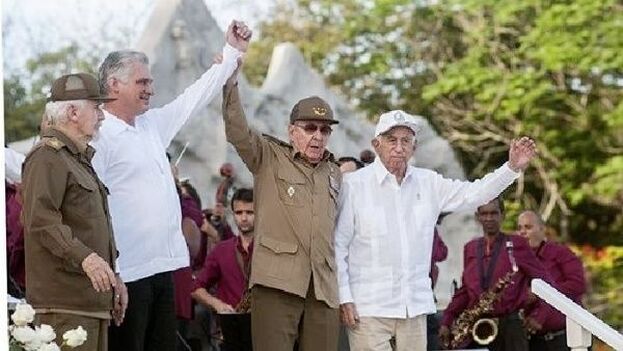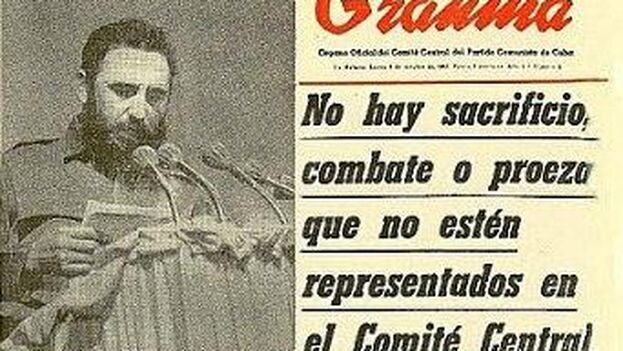
![]() 14ymedio, Reinaldo Escobar, Havana, 4 October 2020 — This October 3rd marked the 55th anniversary of the creation of the first Central Committee of the Cuban Communist Party. The selection of this hundred people followed a scrutiny that only allowed those who had had some participation in the uprising against the previous dictatorship to be promoted, as long as they showed absolute loyalty to Fidel Castro and embraced, even if just in appearance, the Marxist-Leninist ideology.
14ymedio, Reinaldo Escobar, Havana, 4 October 2020 — This October 3rd marked the 55th anniversary of the creation of the first Central Committee of the Cuban Communist Party. The selection of this hundred people followed a scrutiny that only allowed those who had had some participation in the uprising against the previous dictatorship to be promoted, as long as they showed absolute loyalty to Fidel Castro and embraced, even if just in appearance, the Marxist-Leninist ideology.
What is referred to today as “the historic generation of the revolution” got its credentials that day.
If someone were to ask what requirements are needed to appear as a registered member of that generation, no one will probably know how to give a categorical answer, whether he is an academic, a former combatant or a member of the Party. It is a nebulous definition in which a few names are clear and others are not. But the truth is that, although not all out of the 100 chosen carry that label — sometimes simplified as “historic ones” — all who pride themselves on deserving it appear on that list.
Fidel Castro mentioned in public for the first time the idea of creating a unitary entity that would bring together the forces that had fought against the Batista tyranny.
In his speech to commemorate the ninth anniversary of the assault on the Moncada barracks, delivered on July 26, 1961 in the Sports City in Santiago de Cuba, Fidel Castro mentioned for the first time in public the idea of creating a unitary entity that would bring together the forces who had fought against the Batista tyranny: The July 26 Movement, the Revolutionary Directorate and the Popular Socialist Party.
With this decision, other groups were left out of the distribution of power, including the so-called “Triple A,” a derivation of the Authentic Party led by the ousted president Carlos Prío Socarrás, and with it, all those who tried to find a peaceful way out of the Batista dictatorship.
With the entities chosen by Castro, the Integrated Revolutionary Organizations (ORI) were founded as a preliminary basis for the creation of a closer political group.
Barely two months after the speech in Santiago de Cuba, the process of dissolution of the involved entities began, but it was not until March 8, 1962 that the National Directorate of the ORI was presented with 24 members of the three mentioned organizations.
On March 26, after an acute crisis that year, Fidel Castro decided not to wait any longer and turned the ORI into the United Party of the Socialist Revolution of Cuba (PURSC) and, incidentally, placed himself at the head of the new entity. On October 3, 1965, its name was changed to the current Communist Party of Cuba (PCC), and only then was its first Central Committee introduced.
With this decision, other groups were left out of the distribution of power, among them the so-called “Triple A,, a derivation of the Authentic Party led by the ousted president Carlos Prío Socarrás
Strictly from an age point of view, this generation generally includes those born between 1915 and 1940. But the oldest on the list was a member of the former Popular Socialist Party, Juan Marinello, now deceased, who was born in 1898; while the youngest ones were a group of five combatants from the Sierra Maestra born after 1940, whose only active survivor is now General Leopoldo Cintra Frías.
Of that list of 100 founders of the Central Committee, only eight men remain active, 65% have died, the rest are in obscure retirement or have been ousted. There are at least twenty names that don’t even have a file in Ecured, “the Cuban Wikipedia.”
Of the eight active ones, only four maintain real power: Raúl Castro, who is still the first secretary of the Communist Party of Cuba, who, if nature helps him will continue to do so until the eighth Party Congress is held on April, 2021, when he will be two months away from turning 90; the second in command in this organization is José Ramón Machado Ventura, who this October will become a nonagenarian; Leopoldo Cintra Frías, current Minister of the Armed Forces, who is only nine months away from turning 80, and Ramiro Valdés, vice president of the Councils of State and Ministers, who at 88 years of age is in enviable physical shape.

The remaining four active, but with very little decision-making power, are Guillermo García Frías (b. 1928), director of the National Company for the Protection of Flora and Fauna; Major General Ramón Pardo Guerra (b. 1932), chief of the National Civil Defense General Staff; Julio Camacho Aguilera (b. 1924), who serves as Director of the Office for the Fundamental Development of the Guanahacabibes Peninsula, and Enrique Lusson, who is a member of parliament.
Of the eight active ones, only four maintain real power: Raúl Castro is still The First Secretary of the Communist Party of Cuba
For the youngest in Cuba, any official who is over 70 years of age can also be considered “historic,” although strictly speaking, it is not appropriate to for him be included in the revolutionary Parnassus of the Historic Generation. Such is the case of characters of some importance and of a certain age, such as Salvador Valdés Mesa (b. 1941), current Vice President of the Republic, who entered the Central Committee of the PCC in its fourth Congress in 1991; Esteban Lazo (b. 1944), current president of the National Assembly of People’s Power, who attained entry to the CC in the first Congress of 1975, as did Ulises Rosales del Toro (b. 1942), who was recently released from his responsibilities as vice president of the Council of Ministers and was appointed director of the Program for Versatile Plants Program.
In addition to the unappealable knowledge of biology, he who belongs in history will be in charge of judging each one for their own actions. Belonging to that generation presumes to assume not only “the glory that has been lived” — as stated in the official speech — but also all the guilt. The new faces that have landed in power, under the motto “we are the continuity,” must know that they also carry those responsibilities. With the same degree of guilt.
They carry on their shoulders the actions of the historic ones.
Translated by Norma Whiting
____________
COLLABORATE WITH OUR WORK: The 14ymedio team is committed to practicing serious journalism that reflects Cuba’s reality in all its depth. Thank you for joining us on this long journey. We invite you to continue supporting us by becoming a member of 14ymedio now. Together we can continue transforming journalism in Cuba.
